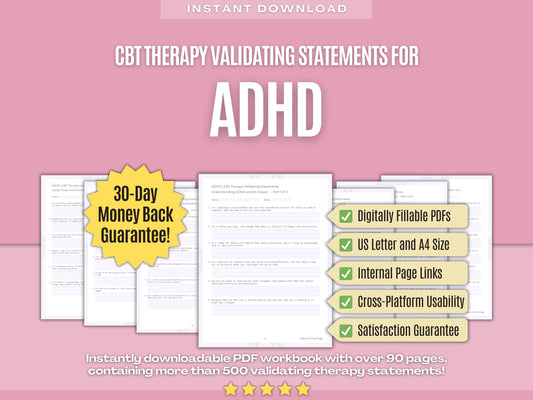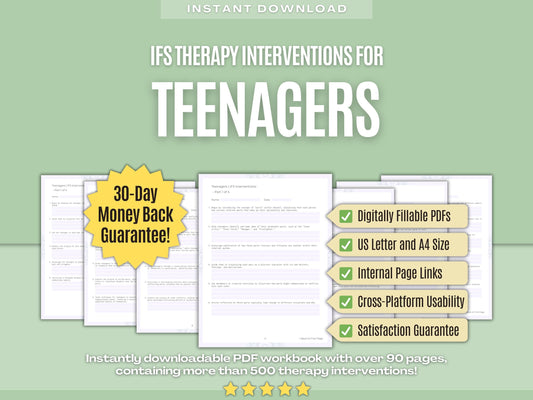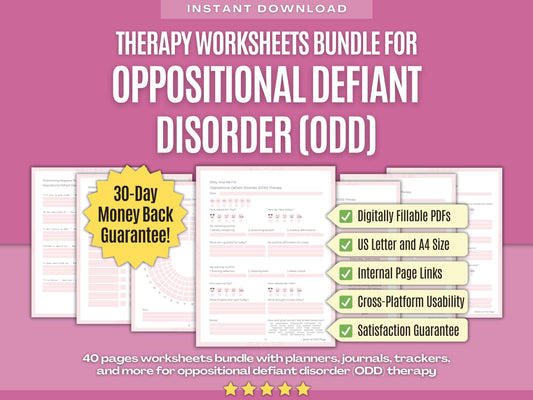Elevate Your Therapy and Guide Your Clients to Inner Healing with Our ADHD Therapy Progress Notes! ✨
1. Commencing Therapy Sessions
- Today's session marked the commencement of therapy sessions focused on addressing the client's ADHD symptoms and related challenges.
- The client expressed readiness and commitment to engage in the therapeutic process, demonstrating a proactive approach toward symptom management.
- The therapist provided a brief overview of the structure and format of therapy sessions, emphasizing the importance of active participation and feedback.
- We revisited the client's current challenges and identified any emerging issues or priorities to be addressed in therapy.
- The therapist introduced cognitive-behavioral strategies aimed at enhancing executive functioning skills, including organization, time management, and task prioritization.
- The client was encouraged to track their progress and experiences between sessions using self-monitoring tools or journals.
- The therapist introduced mindfulness techniques and stress management strategies to help the client cultivate greater self-awareness and emotional regulation.
- We explored potential barriers to treatment adherence or engagement, brainstorming solutions to overcome these obstacles effectively.
- Homework assignments were assigned to reinforce concepts discussed in therapy sessions and facilitate skill-building outside of the therapeutic context.
- We discussed the importance of self-compassion and resilience in navigating the ups and downs of managing ADHD symptoms.
- Strategies for enhancing self-advocacy and communication skills were explored to empower the client in various life domains.
Need more? Find all 500+ Therapy Progress Notes for ADHD Therapy in our Digital Workbook!
2. ADHD Psychoeducation
- Today's session focused on providing psychoeducation about Attention-Deficit/Hyperactivity Disorder (ADHD) to enhance the client's understanding of the condition.
- We discussed the prevalence of ADHD across the lifespan and its impact on various domains of functioning, including academic, occupational, and social.
- Psychoeducation addressed the heterogeneity of ADHD presentations, highlighting variations in symptom severity, co-occurring conditions, and individual strengths.
- We discussed the importance of early detection and intervention in mitigating the long-term impact of ADHD on academic and psychosocial outcomes.
- We explored the role of genetics and environmental factors in the development and expression of ADHD symptoms, considering familial patterns and environmental stressors.
- Strategies for managing ADHD symptoms were introduced, including medication management, behavioral interventions, and lifestyle modifications.
- Psychoeducation addressed the potential benefits and limitations of medication in treating ADHD symptoms, discussing common medications and their mechanisms of action.
- The therapist provided information about evidence-based psychotherapies for ADHD, such as cognitive-behavioral therapy (CBT), mindfulness-based interventions, and executive function coaching.
- The client was encouraged to identify personal strengths and resources to leverage in managing ADHD-related challenges and pursuing goals.
- Psychoeducation addressed the social and emotional aspects of ADHD, exploring challenges in interpersonal relationships and emotion regulation.
- Strategies for enhancing self-awareness and self-advocacy were discussed, empowering the client to take an active role in their treatment and daily life.
Need more? Find all 500+ Therapy Progress Notes for ADHD Therapy in our Digital Workbook!
3. Mindfulness-Based Interventions
- Today's session centered on introducing mindfulness-based interventions as a therapeutic approach to managing ADHD symptoms and enhancing overall well-being.
- We discussed the relevance of mindfulness in the context of ADHD, highlighting its potential to cultivate attentional control, emotional regulation, and impulse management.
- Psychoeducation on the neuroscience of mindfulness was provided, emphasizing its impact on brain structure and function, particularly in areas associated with attention and self-regulation.
- We discussed the concept of the "mindfulness muscle," likening mindfulness practice to strength training for the brain's attentional systems.
- Strategies for integrating mindfulness into daily life were explored, including formal practices such as meditation and informal practices such as mindful eating or walking.
- We discussed common barriers to mindfulness practice, such as restlessness, boredom, or self-doubt, and explored strategies for navigating these challenges with patience and self-compassion.
- We explored the relationship between mindfulness and impulse control, discussing how mindfulness can create space between stimulus and response, allowing for more intentional behavior.
- Psychoeducation on the benefits of mindfulness for emotional regulation was provided, highlighting research findings on its effectiveness in reducing stress, anxiety, and depression.
- Strategies for integrating mindfulness into existing routines and habits were discussed, emphasizing the importance of consistency and persistence in practice.
- The therapist encouraged the client to explore different mindfulness practices to find those that resonate most deeply with their individual preferences and needs.
- The client was provided with resources and recommendations for further exploration of mindfulness, including books, apps, and local classes or workshops.
Need more? Find all 500+ Therapy Progress Notes for ADHD Therapy in our Digital Workbook!
4. Dialectical Behavior Therapy (DBT)
- Today's session focused on introducing dialectical behavior therapy (DBT) as a comprehensive approach to managing ADHD symptoms and improving emotional regulation.
- We discussed the relevance of DBT for individuals with ADHD, recognizing its potential to enhance coping skills and reduce impulsivity, emotional dysregulation, and interpersonal conflicts.
- Psychoeducation on the biosocial theory of emotion dysregulation was provided, exploring the interaction between biological vulnerabilities and invalidating environments in shaping emotional responses.
- We discussed the concept of radical acceptance, recognizing the importance of acknowledging and validating one's experiences, even in the face of difficulty or distress.
- Strategies for implementing distress tolerance techniques were explored, including self-soothing activities, distraction techniques, and crisis survival skills.
- We explored the role of opposite action in emotion regulation, discussing how engaging in behaviors opposite to one's emotional impulses can lead to shifts in mood and behavior.
- Strategies for setting boundaries, asserting needs, and negotiating conflicts were discussed, drawing on the DEAR MAN and FAST communication skills modules.
- We discussed the concept of dialectics, recognizing that seemingly opposing truths can coexist, and exploring how dialectical thinking can facilitate acceptance and change.
- Strategies for managing impulsive behaviors and urges were discussed, drawing on the PLEASE and IMPROVE the moment skills modules.
- We explored the role of self-compassion in DBT, emphasizing the importance of treating oneself with kindness and understanding, especially in moments of difficulty.
- Strategies for cultivating a life worth living were discussed, exploring values clarification and goal-setting exercises to guide behavior and decision-making.
Need more? Find all 500+ Therapy Progress Notes for ADHD Therapy in our Digital Workbook!
5. Interpersonal Therapy (IPT)
- Today's session focused on introducing interpersonal therapy (IPT) as a structured, time-limited approach to addressing interpersonal difficulties and improving relational functioning in individuals with ADHD.
- We discussed the relevance of IPT for individuals with ADHD, recognizing its potential to enhance social skills, reduce interpersonal conflicts, and improve overall quality of life.
- Psychoeducation on the four problem areas targeted in IPT was provided, including unresolved grief, interpersonal role disputes, role transitions, and interpersonal deficits.
- We discussed the importance of identifying interpersonal stressors and conflicts that may be contributing to the client's emotional difficulties and impairment in functioning.
- Strategies for enhancing communication skills and assertiveness were explored, drawing on techniques such as active listening, "I" statements, and perspective-taking.
- We explored the impact of ADHD symptoms on interpersonal relationships, recognizing the potential for misunderstandings, frustration, and conflict.
- Strategies for addressing unresolved grief or loss were discussed, providing support and validation for the client's emotional experiences and facilitating the grieving process.
- We discussed strategies for navigating role transitions effectively, including setting realistic expectations, seeking support from others, and fostering self-care.
- Strategies for addressing interpersonal deficits, such as social isolation or difficulty forming meaningful connections, were explored, drawing on techniques to enhance social skills and confidence.
- The client expressed confidence in their ability to apply IPT principles and techniques to their interpersonal relationships, recognizing the potential for meaningful change and growth.
- The therapist provided validation and encouragement, acknowledging the client's courage and commitment to improving their interpersonal relationships and overall well-being.
Need more? Find all 500+ Therapy Progress Notes for ADHD Therapy in our Digital Workbook!
6. Emotion-Focused Therapy (EFT)
- Today's session centered on introducing emotion-focused therapy (EFT) as an experiential approach to understanding and transforming emotional experiences in individuals with ADHD.
- We discussed the relevance of EFT for individuals with ADHD, recognizing its potential to enhance emotional regulation, reduce distress, and improve interpersonal relationships.
- Psychoeducation on the role of emotions in ADHD was provided, highlighting the tendency for individuals with ADHD to experience heightened emotional reactivity, impulsivity, and difficulty regulating emotions.
- We discussed the importance of creating a safe and supportive space for emotional expression and exploration, fostering a sense of validation and acceptance of one's emotional experiences.
- Strategies for identifying and naming emotions were explored, drawing on techniques such as emotion tracking, mindfulness, and somatic awareness.
- We discussed the concept of emotional avoidance, recognizing that individuals may engage in behaviors or cognitive strategies to avoid or suppress uncomfortable emotions.
- Strategies for exploring and processing core emotional themes were discussed, drawing on techniques such as emotion-focused imagery, chair work, or dialoguing with emotions.
- We explored the role of attachment and early life experiences in shaping emotional schemas and patterns of relating to oneself and others.
- Strategies for expressing and communicating emotions assertively and effectively were discussed, drawing on techniques such as "I" statements, active listening, and empathy.
- The client expressed confidence in their ability to engage in the process of emotional exploration and processing, recognizing the potential for meaningful change and transformation.
- The therapist provided validation and encouragement, acknowledging the client's courage and commitment to exploring and transforming their emotional experiences.
Need more? Find all 500+ Therapy Progress Notes for ADHD Therapy in our Digital Workbook!
7. Psychodynamic Approaches
- Today's session focused on introducing psychodynamic approaches to therapy as a means of exploring unconscious conflicts, early experiences, and relational patterns in individuals with ADHD.
- We discussed the relevance of psychodynamic approaches for individuals with ADHD, recognizing their potential to uncover underlying psychological dynamics contributing to symptom manifestation.
- Psychoeducation on the structure of the psyche, including the id, ego, and superego, was provided, highlighting the interplay between conscious and unconscious mental processes.
- We discussed the importance of exploring the client's early childhood experiences and attachment relationships, recognizing their impact on personality development and symptom expression.
- Strategies for uncovering unconscious material were explored, drawing on techniques such as free association, dream analysis, and interpretation of symbolic imagery.
- We discussed the concept of transference, recognizing that the client may unconsciously transfer feelings and attitudes from past relationships onto the therapist.
- Strategies for working through resistance and defense mechanisms were discussed, focusing on creating a nonjudgmental space for exploring difficult emotions and thoughts.
- We explored the client's intrapsychic conflicts and ambivalent feelings toward their ADHD symptoms, recognizing the complexity of their inner world.
- Strategies for fostering insight and self-awareness were discussed, including reflective exercises, journaling, and exploring patterns in interpersonal relationships.
- The client expressed curiosity and openness to exploring their unconscious mind and unresolved conflicts, recognizing the potential for gaining insight and understanding.
- The therapist provided validation and encouragement, acknowledging the client's courage and commitment to exploring their inner world and making meaningful changes.
Need more? Find all 500+ Therapy Progress Notes for ADHD Therapy in our Digital Workbook!
8. Music Interventions
- Today, we explored the therapeutic potential of music interventions in managing ADHD symptoms, focusing on how music can positively impact mood, attention, and executive functioning.
- We engaged in rhythmic activities such as drumming or tapping to help regulate energy levels and promote a sense of groundedness and focus.
- Today, we practiced mindfulness-based music listening exercises, tuning into the present moment and noticing sensations, emotions, and thoughts without judgment.
- We experimented with music improvisation as a means of fostering creativity, flexibility, and problem-solving skills, embracing spontaneity and playfulness.
- Today, we engaged in a group music therapy session, fostering social connection and communication skills through collaborative music-making activities.
- We practiced music-based movement exercises, such as dance or rhythmic gymnastics, to enhance body awareness, coordination, and sensory integration.
- Today, we discussed the use of personalized playlists as a mood management tool, curating music collections tailored to your emotional needs and preferences.
- We explored the therapeutic value of live music experiences, such as attending concerts or participating in community music events, to promote social engagement and sensory stimulation.
- Today, we practiced music-based attention training exercises, using rhythm and melody to structure and sustain focus on tasks or activities.
- We discussed the potential benefits of incorporating music therapy into other treatment modalities for ADHD, such as medication management or behavioral therapy.
- Today, we explored the concept of music as a form of self-care, using music listening or music-making as a coping strategy during times of stress or overwhelm.
Need more? Find all 500+ Therapy Progress Notes for ADHD Therapy in our Digital Workbook!
9. Therapy Session Wrap-Up
- Today, we reflected on the themes and insights that emerged during our therapy session, summarizing key takeaways and discussing how they relate to your ADHD journey.
- We discussed any challenges or obstacles you encountered since our last session, exploring strategies to overcome them and build resilience in the face of setbacks.
- Today, we reflected on any patterns or trends in your thoughts, behaviors, or emotions that you've noticed throughout therapy, gaining deeper insight into your ADHD experience.
- We discussed your experiences outside of therapy and how they may have influenced your ADHD symptoms or treatment progress, integrating real-life experiences into our therapeutic work.
- Today, we discussed any new challenges or stressors that have arisen since our last session, exploring proactive strategies to manage them effectively.
- We explored any interpersonal dynamics or relationship issues that may be affecting your ADHD management, discussing strategies for improving communication and setting boundaries.
- Today, we reflected on the therapeutic relationship and our collaboration in therapy, discussing what's been helpful or challenging and how we can continue to work together effectively.
- We discussed any lingering questions or uncertainties you have about ADHD or the therapeutic process, providing clarification and support to address them.
- We discussed any self-care practices or routines you've implemented since our last session, exploring ways to prioritize your well-being and recharge your energy reserves.
- Today, we discussed any insights gained from your interactions with others, exploring how social support and connections can contribute to your ADHD management.
- We explored any insights gained from your experiences with ADHD-related stigma or societal expectations, discussing strategies for building self-acceptance and resilience.
Need more? Find all 500+ Therapy Progress Notes for ADHD Therapy in our Digital Workbook!
10. Concluding Therapy Sessions
- Today marks the conclusion of our therapy journey together, and I want to take this opportunity to reflect on the progress you've made and the growth you've experienced since we began.
- Throughout our time together, you've demonstrated resilience, determination, and a willingness to explore new ways of approaching challenges associated with ADHD.
- I want to acknowledge the courage it takes to engage in therapy and to confront the complexities of living with ADHD, and I commend you for your commitment to your own well-being.
- We've celebrated your successes, whether they were big milestones or small victories, and we've navigated setbacks with compassion and resilience.
- While our formal therapy sessions may be coming to an end, please know that the skills and insights you've gained will continue to serve you well in your ongoing journey with ADHD.
- Remember that progress is not always linear, and it's okay to have good days and bad days as you navigate the ups and downs of life with ADHD.
- As we part ways, I want to remind you that you are not alone in your struggles, and there is a community of support available to you whenever you need it.
- While our formal therapy sessions may be ending, I hope you will carry forward the insights, skills, and resilience you've gained into all aspects of your life.
- As we conclude our sessions, I want to encourage you to take time to reflect on your therapy journey and to acknowledge the progress you've made, no matter how small it may seem.
- I want to express my gratitude for the opportunity to work with you, and for the trust and openness you've brought to our therapeutic relationship.
- Please know that you are not defined by your ADHD, and that you have the strength and resources within you to overcome any challenges that may come your way.
We hope that our therapy progress notes for ADHD therapy will help you to elevate your therapy practice and guide your clients to inner healing! Do you need more therapy progress notes for ADHD therapy? Find them all in our Digital Workbook! Or do you have any questions or suggestions for us? Please feel free to contact us at any time!


















